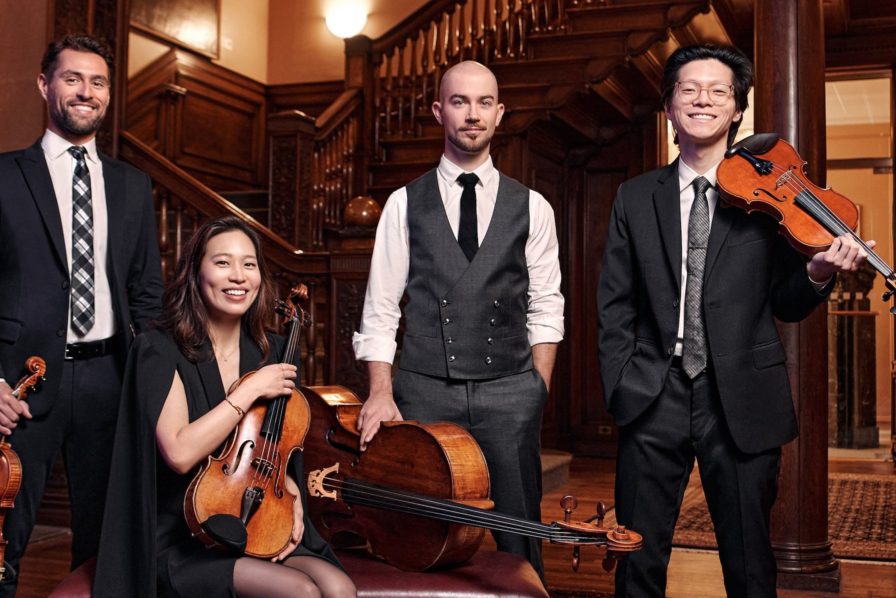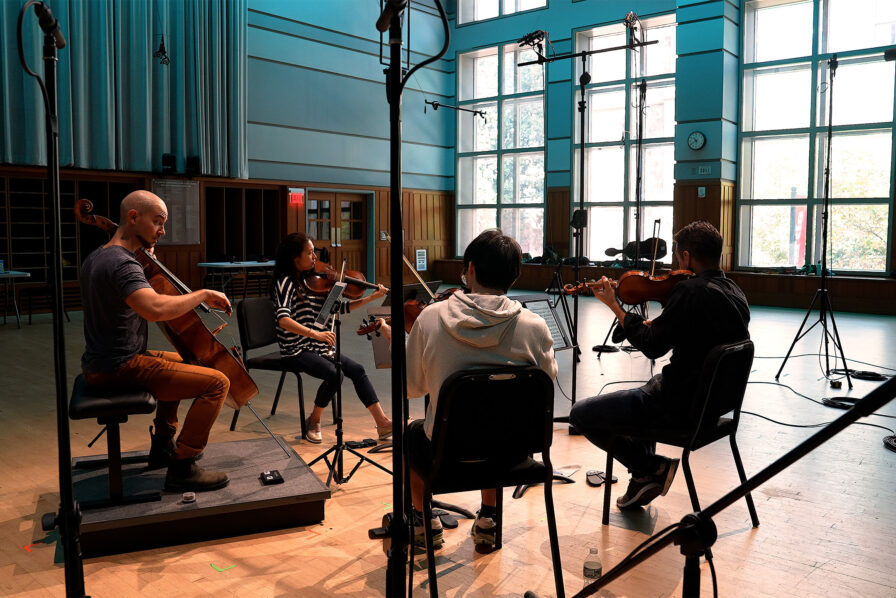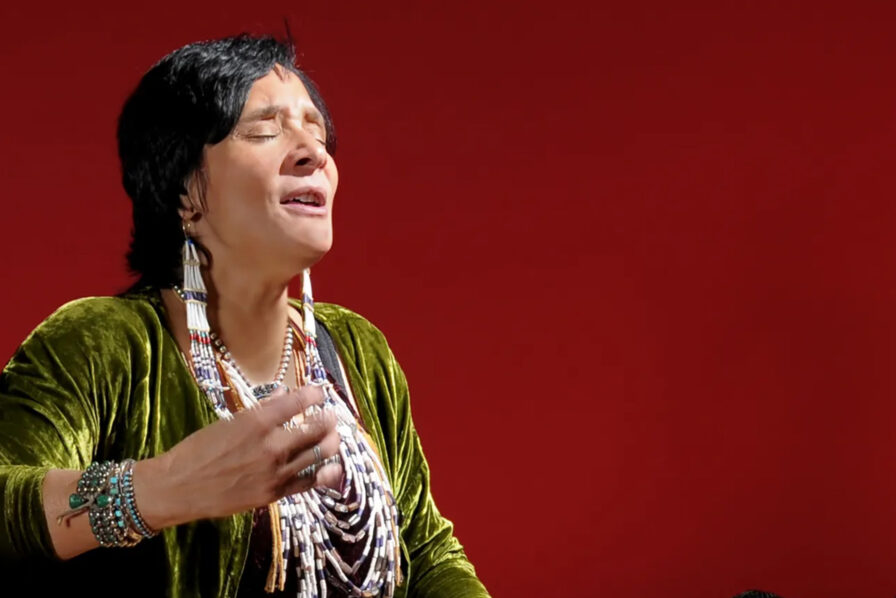Woodland Songs

Dover Quartet: Music of Jerod Impichcha̱achaaha' Tate, Pura Fé, & Dvořák
Named one of the greatest string quartets of the last 100 years by BBC Music Magazine and “the next Guarneri Quartet” by the Chicago Tribune, the two-time GRAMMY-nominated Dover Quartet is one of the world’s most in-demand chamber ensembles.
The album features the world premiere recording of Abokkoli’ Taloowa’ (Woodland Songs) by the Chickasaw-American composer Jerod Impichcha̱achaaha’ Tate, and of his orchestration for string quartet of Rattle Songs, by the Indigenous singer-songwriter Pura Fé, a founding member of the Native women’s a cappella group Ulali. Both contemporary artists find inspiration from the traditional music of their respective tribes and traditions—Tate is Chickasaw; Pura Fé is Tuscarora/Taino—but also imbue their music with wholly original ideas.
About
“This album is, at its heart, an exploration of the rich inheritance of music from the North American continent. While the three works on this album contrast each other substantially in style, expression, and historical context, they all share the common influence of music native to North America. Jerod Impichcha̱achaaha’ Tate and Pura Fé both find inspiration from the traditional music of their respective tribes and traditions but also imbue their music with wholly original ideas.
This was also the case for Antonín Dvořák when writing the “American” quartet—although of course, he was not of Native heritage. Too often we forget that Dvořák’s aim in this piece was to identify an “American” sound by drawing from the melodies of Native peoples and African Americans.
Each piece exists in its own sonic and textural world, while informing and enriching the way we listen to the others. It was many years of work to get this project to come together and we couldn’t be more grateful to have had the opportunity to share it.”
—Dover Quartet

Tracklist
-
Pura Fé: Rattle Songs
Orch. Jerod Impichcha̱achaaha’ Tate
- No. 1, Shanoojhee
- No. 2, Viri Kuta
- No. 3, Haweheemo
- No. 4, Grammah Easter’s Lullaby
- No. 5, For the Pepper
- No. 6, Women’s Shuffle
- No. 7, Great Grandpa’s Banjo
“Rattle Songs is a suite of compositions created by the Tuscarora vocalist, Pura Fé, for the ensemble Ulali. Pura Fé’s Tuscarora cousin, Jennifer Kreisberg, and Maya/Apache friend, Soni Moreno, are the other two vocalists of the group. In 1994, this Native trio made history when they released their album, Mahk Jchi (Our Hearts). This album is a unique work of genius, where Native songs are modernized through innovative arrangements and stunningly rich harmonies. Their work had a powerfully deep impact on my personal vision as a Native composer and I am privileged that they are my friends.
Chickasaw music is based in turtle shell shaking, as is our percussion for stomp dancing and social songs. The Tuscarora people share a very similar shell shaking tradition, as do most Native woodland tribes. In Rattle Songs, Ulali brought together songs from different parts of Indian Country and brilliantly couched them in traditional woodland shell shaking styles.
Camden Shaw, cellist of the Dover Quartet, also happens to be a fan of the Mahk Jchi album. Upon his discovery that I have an affinity for Ulali, he asked if I might be interested in orchestrating Rattle Songs for string quartet. My immediate acceptance and enthusiasm could not be overstated. After consulting with Pura Fé, I have created these orchestrations that are classically impressionistic in a post-modern style. I make no deliberate attempt to imitate the exact sound of rattles from the original songs; rather, I have created a new home for them in the String quartet. Pura Fé created Rattle Songs as an homage to her Native North American cousins and it is my hope that my orchestrations create another layer of honoring our people.”
—Jerod Impichcha̱achaaha’ Tate
-
Jerod Impichchaachaaha' Tate: Abokkoli' Taloowa' (Woodland Songs)
- No. 1, Fani’ (Squirrel)
- No. 2, Bakbak (Woodpecker)
- No. 3, Issi’ (Deer)
- No. 4, Nani’ (Fish)
- No. 5, Shawi’ (Raccoon)
“Abokkoli’ Taloowa’ (Woodland Songs), commissioned by Dover Quartet, is a modern Chickasaw composition about woodland animals from our Southereastern homelands. Our traditional woodland animals are so revered that our family clans are named after them. My family is Shawi’ Ilksa’—Raccoon Clan.
Each woodland animal has a special ethos and there are many traditional stories about them. In this work, five woodland animals are represented: Squirrel, Woodpecker, Deer, Fish, and Raccoon. Each movement is like an epitome—a deep, dramatic, and rhapsodic expression of my feelings of being a Chickasaw man from a beautiful and robust culture. I love our animals, and I love composing works about them.
Abokkoli’ Taloowa’ (Woodland Songs) is full of Chickasaw melodies, rhythms, and musical structure. Sometimes these elements appear very clearly, where the melody may romantically soar above the ensemble. Sometimes they are abstracted into the texture of the quartet and hidden inside the spirit of the animal. I allow myself to fluidly dance between cultural clarity and modern expressionism. I am deeply inspired by our modern Native artists, choreographers, authors and filmmakers—each proudly expressing their individual identity within rich ancestry. I encourage each listener to create their own emotional story of each animal and imprint these legends into their hearts.”
—Jerod Impichcha̱achaaha’ Tate, composer
-
Antonín Dvořák: String Quartet No. 12 in F major, Op. 96, B. 179 “American”
- I. Allegro ma non troppo
- II. Lento
- III. Molto vivace
- IV. Finale. Vivace ma non troppo
Composing 14 string quartets during his lifetime, Antonín Dvořák was a prolific Romantic composer known for incorporating folk music elements in his pieces. Ill-content with the mostly German classical music scene in Europe, he was lured to New York City in 1892 by Jeanette Thurber, founder of the National Conservatory of Music of America. It is here where he was given the challenge to come up with a distinctive brand of American classical music—a question that had been hotly debated for nearly 120 years.
During the summer of 1893 while on vacation to a Czech immigrant community in Spillville, Iowa, he answered this question with his String Quartet No. 12 in F major. Sketched in three days and completed in thirteen more, upon finishing Dvořák proclaimed “Thank God! I am content. It was fast.” It was his second attempt at writing a quartet in F major—his first coming twelve years earlier but only resulted in a single completed movement.
Nicknamed “American,” Dvořák was drawn to the music of Native and African American traditions, blending these influences with his own musical roots in this quartet. Many of the melodies are based on the five-note pentatonic scale instead of the typical eight0note. The work also features frequent syncopations, accents on unexpected beats, and lively rhythmic energy.
In the first movement, Allegro ma non troppo, Dvořák introduces two main themes: the first, a cheerful tune played by the viola; the second, a more solemn melody sung by the first violin that recalls the spirit of his New World Symphony. During the development, the second violin offers a contrasting response in F minor before the themes return in the recapitulation. The second movement, Lento, reflects Dvořák’s signature lyrical style, described by one scholar as an almost “Bohemian blues.” The third movement, Molto Vivace, is a playful scherzo driven by lively rhythms and is a nod to Dvořák’s love of birdwatching. The high violin tune here is inspired by the Scarlet Tanager, a bird he encountered while in Spillville, Iowa. The Finale. Vivace ma non troppo, contains unwavering energy and syncopations established by the second violin and viola. This rhythmic foundation allows the first violint o soar, concluding the piece with a hymn-like freedom.
Critical Acclaim
“Hearing Dvořák’s ‘American’ Quartet in the context of these fresh, raw-edged works, however, brings whole new insights into the composer’s folksy harmonic sidesteps and chugging, syncopated rhythms. It makes for a remarkably enlightening combination of music, all performed with verve and insight by the Dover players, and captured in close, rich, immaculate sound.”
“Woodland Songs is a wondrous, deeply American musical journey that feels both timeless and urgently of the moment.”
Artists

-
Dover Quartet
Dover Quartet
Joel Link | Violin
Bryan Lee | Violin
Julianne Lee | Viola
Camden Shaw | CelloThe two-time GRAMMY-nominated Dover Quartet, hailed by BBC Music Magazine as one of the greatest string quartets of the past century, is among the world’s most in-demand chamber ensembles. Winners of top prizes at the Banff, Fischoff, and Wigmore Hall competitions, they have also earned prestigious honors including the Avery Fisher Career Grant and Chamber Music America’s Cleveland Quartet Award. Formed in 2008 at the renowned Curtis Institute of Music, the members of the quartet now serve on the school’s faculty.
Acclaimed for their celebrated recordings, including Beethoven Complete String Quartets and The Schumann Quartets, their 2025-26 season features collaborations with leading artists such as Edgar Meyer and Marc-André Hamelin, performances in internationally renowned venues from Carnegie Hall to Konzerthaus Berlin, and premieres of commissioned works by Jerod Impichcha̱achaaha’ Tate, of which this album arose.
-
Jerod Impichchaachaaha' Tate
Jerod Impichcha̱achaaha’ Tate is a Chickasaw-American father, classical composer, and citizen of the Chickasaw Nation in Oklahoma, dedicated to the development of American Indian classical composition. He is a 2022 Chickasaw Hall of Fame inductee and a 2022 Distinguished Alumni Award recipient from The Cleveland Institute of Music. In 2021, he was appointed a Cultural Ambassador for the U. S. Department of State. In 2025, Tate won the Wise-Hinrichsen Award in Music from the American Academy of Arts and Letters.
Among many recent premieres, Tate’s highlights include commissions from the New York Philharmonic, American Composers Orchestra, Cantori NY, Turtle Island Quartet, and Dover String Quartet. Oklahoma’s Canterbury Voices and the Oklahoma Symphony Philharmonic premiered Tate’s first opera, Loksi’ Shaali’ (Shell Shaker), PostClassical Ensemble presented an all-American-Indian program curated by Tate in Washington D.C., his American Indian Symphony was performed at the Oklahoma City Philharmonic, and his popular work Chokfi’ has been programmed by symphonies across the country. Tate is currently at work on new commissions by Roomful of Teeth, violinist Irina Muresanu, Skaneateles Festival, and Big 10 Band Directors Association.
Tate is a three-time commissioned recipient from the American Composers Forum, a Chamber Music America Classical Commissioning Program recipient, a Cleveland Institute of Music Alumni Achievement Award recipient, a governor-appointed Creativity Ambassador for the State of Oklahoma and an Emmy Award-winner for his work on the Oklahoma Educational Television Authority documentary The Science of Composing. His music was also featured in the HBO series Westworld.
Tate earned his Bachelor of Music in Piano Performance from Northwestern University and his Master of Music in Piano Performance and Composition from The Cleveland Institute of Music. His middle name, Impichchaachaaha’, means “their high corncrib” and is his inherited traditional Chickasaw house name. Learn more at www.jerodtate.com.
-
Pura Fé
Pura Fé (Tuscarora/Taino/Black/Scottish) is an Indigenous activist, singer-songwriter, and storyteller known for her distinct, soulful vocals and founding the world-renowned Native women’s a Capella singing group Ulali
As the founding member of Ulali, Pura Fé helped to create a movement throughout Indian Country, which not only empowered Native Women’s hand drum and harmony, but also built a bridge for Native music into the mainstream music scene. Ulali’s unique fusion of ancestral music, cultural roots, and message has left its mark. Ulali has recorded music for soundtracks, television commercials, has had platinum sales in Italy, and appeared at several events for the benefit of Indigenous Peoples and the environment.
Pura Fé is part of the Silk Road Project, under the direction of Rhiannon Giddens, started by Yo Yo Ma and currently touring with the performances American Railroad and Uplifted Voices.
Learn more at purafe.com
For Presenters
Dover Quartet is represented by Curtis Artist Management. Visit the quartet’s artist management page to learn more and to contact a booking representative.
Executive producer: Vince Ford
Producer: Alan Bise
Recording engineer: Drew Schlegel
Mastering engineer: Alex Santilli
Atmos engineer: Stan Kybert
Assistant producers: Daniel J. Armistead, Vince Ford
Liner notes: Jerod Impichcha̱achaaha’ Tate, Daniel J. Armistead
Recorded: September 13–14, 2024; January 8–9, 2025 in Gould Rehearsal Hall at Curtis Institute of Music, Philadelphia, PA
Release date: August 15, 2025
Album art by LOKOSH
Abokkoli’ Taloowa’ (Woodland Songs) and the orchestration of Rattle Songs were
commissioned for the Dover Quartet by Curtis Institute of Music and the following co-commissioners: Arizona Friends of Chamber Music; Cal Performances, UC Berkeley; Carnegie Hall; Chamber Music Houston; Chamber Music Northwest; Chamber Music Pittsburgh; Chamber Music Society of Fort Worth; Friends of Chamber Music Denver; Kingston Chamber Music Festival; Northwestern University’s Bienen School of Music; and Shriver Hall Concert Series.



